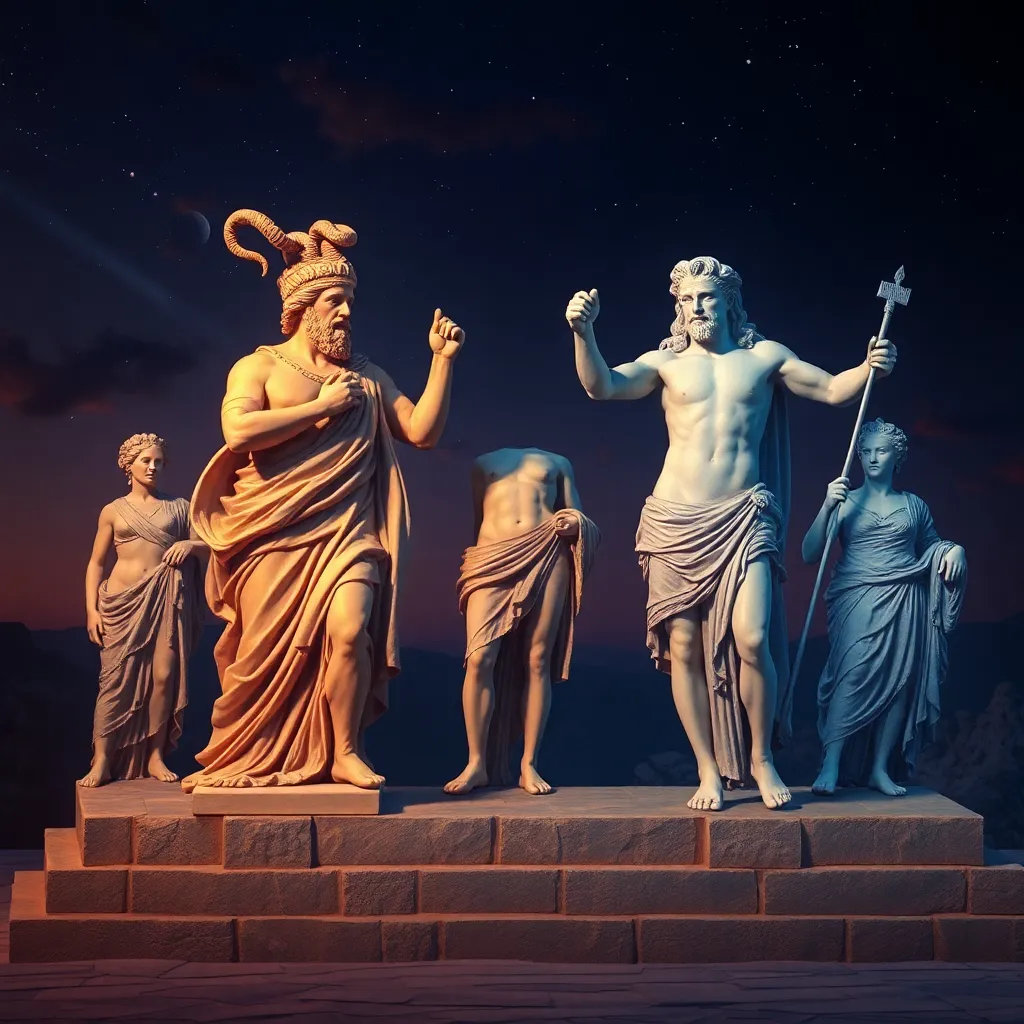The Olympians and Their Influence on Modern Philosophy
I. Introduction
The Olympians are the principal deities of ancient Greek mythology, residing atop Mount Olympus. Each god and goddess embodies distinct traits and domains, influencing not only the lives of mortals but also the philosophical underpinnings of Western thought. Their stories serve as rich narratives that explore human experience, ethics, and the nature of existence. This article seeks to delve into the profound connections between these mythological figures and contemporary philosophical concepts, illustrating how the lessons from the Olympians continue to resonate in modern discourse.
II. The Olympian Pantheon: Key Figures and Their Attributes
The Olympian pantheon is composed of twelve major gods and goddesses, each representing various aspects of life, nature, and human experience. Here are some of the key figures:
- Zeus: King of the gods, associated with thunder and divine law.
- Hera: Queen of the gods, goddess of marriage and family.
- Athena: Goddess of wisdom, war, and crafts.
- Apollo: God of the sun, music, and prophecy.
- Aphrodite: Goddess of love and beauty.
- Hades: God of the underworld and the dead.
These deities are not mere fictional characters; they embody essential human traits and societal values. For example, Athena represents wisdom and strategic warfare, reflecting the importance of intelligence and strategy in human affairs. Their stories often illustrate the complexities of human emotions, ethical dilemmas, and the consequences of actions, mirroring the moral struggles faced by individuals in society.
III. The Olympians as Archetypes in Philosophy
Archetypes are universal symbols or themes that recur across cultures and time periods. In philosophy, they provide frameworks for understanding human behavior and societal dynamics. The Olympians serve as archetypes that resonate deeply in modern philosophical discourse:
- Zeus as Authority: Represents the concept of power and governance.
- Athena as Wisdom: Embodies the pursuit of knowledge and moral guidance.
- Aphrodite as Desire: Illustrates the complexities of love and human connection.
These archetypes have influenced contemporary moral and ethical frameworks, providing a lens through which we can examine our values and societal structures. They remind us of the innate qualities and struggles that define the human experience, fostering a deeper understanding of our own identities and choices.
IV. The Influence of Olympian Myths on Ethical Theories
Ethical theories, such as virtue ethics, deontology, and consequentialism, seek to guide human behavior and decision-making. The narratives of the Olympians provide rich contexts for exploring these ethical frameworks:
- Virtue Ethics: Focuses on character and virtues. The stories of heroes like Hercules demonstrate the development of personal virtues through trials.
- Deontology: Emphasizes duty and rules. The actions of gods like Zeus often highlight the consequences of violating divine laws.
- Consequentialism: Considers the outcomes of actions. Myths such as the tale of Prometheus reveal the complexities of choices and their repercussions.
Through these narratives, ancient myths inform our understanding of ethical decision-making. For instance, the myth of Icarus serves as a cautionary tale about hubris and the importance of moderation, illustrating the moral dilemmas faced by individuals in their pursuits.
V. The Olympians and Existential Questions
Existential themes permeate Olympian myths, addressing fundamental questions about fate, free will, and mortality. The struggles of figures such as Prometheus and Odysseus reflect the existential dilemmas faced by humans:
- Fate vs. Free Will: Many myths explore the tension between predestined events and personal choice.
- Mortality: The gods’ interactions with mortals often highlight the ephemeral nature of life and the quest for meaning.
Comparing these themes with the works of existentialist philosophers like Jean-Paul Sartre and Albert Camus reveals parallels in the exploration of human existence and the search for purpose. The Olympians serve as a reminder that, despite divine intervention, individuals must grapple with their own identities and choices.
VI. The Role of the Olympians in Political Philosophy
The stories of the Olympians offer insights into power dynamics and governance, influencing political philosophy significantly. Themes such as justice, authority, and rebellion are prevalent:
- Justice: The concept of divine justice, as enacted by Zeus, informs modern theories of justice and rights.
- Power Dynamics: The conflicts among gods reflect the complexities of political authority and governance.
Political philosophers, such as Plato and Machiavelli, have drawn upon these themes to discuss the nature of power and the responsibilities of leaders. The narratives encourage critical reflection on how power should be wielded and the moral obligations of those in authority.
VII. The Olympians in Contemporary Philosophy and Culture
Today, the influence of Olympian mythology is evident in various philosophical movements and cultural expressions. Modern thinkers continue to reference these ancient figures:
- Philosophical Movements: Some contemporary philosophies engage with Greek mythology to explore identity, ethics, and existentialism.
- Literature and Art: The portrayal of Olympians in contemporary literature, films, and visual arts reflects ongoing cultural relevance.
These figures address modern philosophical issues, such as the nature of existence, ethical behavior, and the search for meaning, demonstrating their enduring legacy in our collective consciousness.
VIII. Conclusion
In summary, the Olympians have profoundly influenced philosophical thought, reflecting human values, ethical dilemmas, and existential questions. As archetypes and symbols, they provide a framework for understanding our own lives and choices. The enduring legacy of the Olympians invites us to explore further connections between mythology and contemporary philosophy, enriching our understanding of the human experience.
As we continue to navigate the complexities of modern existence, the lessons from these ancient deities remain relevant, guiding our reflections on morality, power, and the essence of being.




